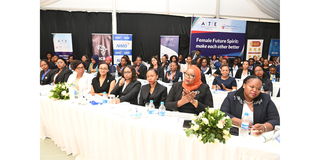Prime
Majaliwa tells women to grab opportunities brought by technology

Various leaders listen to Prime Minister Kassim Majaliwa speak at the Serena Hotel in Dar es Salaam yesterday during the opening of the Female Future Programme Cohort 8 conference. PHOTO | PMO
What you need to know:
- The call was made yesterday by Prime Minister Kassim Majaliwa during a graduation ceremony for Female Future Programme Cohort 8
Dar es Salaam. In a new effort to create a robust digital economy, the government urged women and Tanzanians, in general, yesterday to take advantage of opportunities presented by the quickly developing technology.
The call was made yesterday by Prime Minister Kassim Majaliwa during a graduation ceremony for Female Future Programme Cohort 8.
The programme, which was inaugurated in 2016 by the then Vice President, now President, Samia Suluhu Hassan, is coordinated by the Association of Tanzania Employers (Ate) in collaboration with the Confederation of Norwegian Enterprises (NHO).
The Premier said despite various barriers to trade, women have been at the forefront of participating in the digital economy through online business.
“This will help to not only shape the country’s economy but also raise an individual’s income,” said Mr Majaliwa.
The government, for its part, he said, will keep on collaborating with the private sector to create a conducive business environment.
“Digital changes touch a number of areas of our day-to-day lives. As a matter of fact, it is everyone’s responsibility to be part of the changes,” said Mr Majaliwa.
He went on to add: “The transition to the digital world is among the priorities of the nation.”
In those changes, he emphasised, it is of paramount importance to recognise the contribution of women so that they can fully take part in building the digital economy.
He urged the public and private sectors to continue collaborating and investing in female leaders so that they could cope with the digital changes.
“We must improve our systems if we are to increase women’s participation in the digital economy,” said Mr Majaliwa.
Ms Unni Fjær, the chief executive officer of Equinor- an international energy company, expressed the need to embrace technology and digitisation as a tool for success.
“Diversity in technology is instrumental for success. Let us help women with skills, knowledge, and capacity to occupy highly leadership positions,” she said.
In recent years, climate change has become very prominent, and an energy transition is required.
This, explained Ms Fjær, is where diversity, equity and inclusion come in to help the globe apply innovative thinking to saving the world.
The world wants greenhouse gas emissions to reach net zero by 2050.
This translates to cutting greenhouse gases by about 50 percent by 2030, alongside significant removal of carbon dioxide from the atmosphere. “This is a truly ambitious goal that requires excellent people that are able to perform at their very best,” said Ms Fjær.
“That is why in Equinor, diversity in technology and equal rights for men and women are important. We strongly believe diversity drives creativity and innovation and facilitates business results.”
Ate chief executive officer Suzanne Ndomba-Doran said some 65 women from 29 companies graduated in yesterday’s Female Future Program Cohort 8. She said a programme offers courses on leadership, communication and board competency.
Since its inauguration, a total of 274 women from 79 companies have graduated, according to Ms Ndomba-Doran.
“This is a massive investment and it surely pays off,” she concluded.



